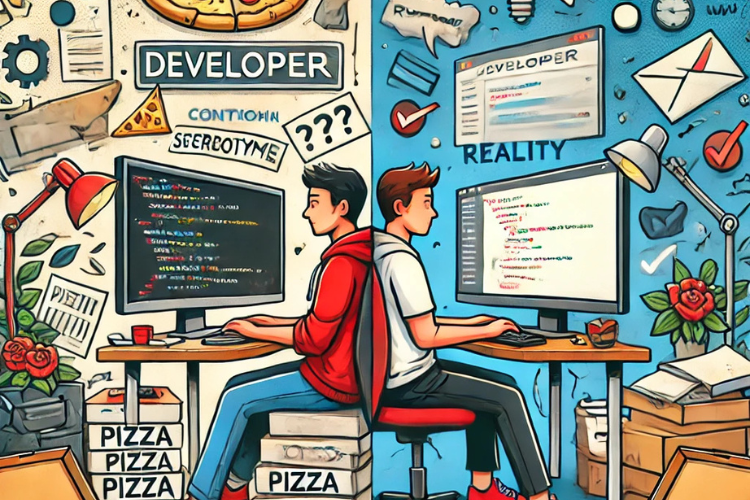Introduction
Many junior developers dream about the perks of becoming a senior. They picture themselves solving every problem, working with cutting-edge tools, and enjoying more freedom. But the reality is far more nuanced. Transitioning to a senior developer role involves continuous growth, learning, and handling responsibilities that many might overlook.
At StartupHakk, with over 25 years of development experience, I help train aspiring developers to become full-stack professionals in just three months. Today, let’s bust some common myths about becoming a senior developer and explore what this journey truly entails.
Misconceptions and Realities
1. Seniors Have All the Answers
Expectation: As a senior, I’ll instantly solve every bug and know the solution to all problems.
Reality: The more you learn, the more you realize how much there is to discover. Seniority is not about knowing everything. It’s about approaching challenges efficiently and asking the right questions.
As a senior, you learn strategies for problem-solving rather than memorizing answers. This mindset fosters continuous learning and adaptability—skills that help you navigate the ever-evolving tech landscape.
To put it in perspective, senior developers often spend significant time researching, experimenting, and collaborating with their teams to arrive at the best solutions. It’s not about instant answers; it’s about effective problem-solving.
Key Takeaway: Focus on improving your problem-solving techniques, not memorizing solutions.
2. Working with the Latest Tech
Expectation: Senior developers always use cutting-edge tools and technologies.
Reality: While new technologies are exciting, much of a senior’s role involves maintaining and improving legacy systems. These systems often hold years of business logic and operational insights that are critical for a company’s success.
Optimizing legacy systems can be challenging, but it’s also rewarding. It’s about making old systems more efficient without losing the value they’ve accumulated over time. Moreover, this experience enhances your ability to adapt to diverse technical environments and solve complex problems.
Many senior developers find themselves balancing old and new technologies, which requires a deep understanding of both. This blend of work offers a unique opportunity to innovate while preserving business continuity.
Key Takeaway: Embrace the opportunity to work with legacy systems—they teach resilience and resourcefulness.
3. No More Boring Tasks
Expectation: Seniors avoid mundane tasks like documentation and meetings.
Reality: Senior roles come with their own set of routine responsibilities, such as code reviews, documentation, and team meetings. These tasks might not seem glamorous, but they’re crucial for maintaining project continuity and ensuring quality.
Writing clear documentation and participating in discussions ensure that your team stays aligned. These tasks might feel repetitive, but they are essential for long-term success. Additionally, they provide a platform to share knowledge and mentor junior developers, which is a vital part of a senior’s role.
Think of these tasks as building blocks for a robust and efficient team. Every small effort contributes to larger achievements.
Key Takeaway: View routine tasks as opportunities to improve team collaboration and project quality.
4. Making Big Changes
Expectation: As a senior, I’ll have the authority to make significant changes effortlessly.
Reality: Major changes require careful planning, management approval, and budget considerations. Even with great ideas, you need to present them in a way that aligns with organizational goals.
As a senior, you’ll develop skills to advocate for your ideas effectively. Patience and persistence are vital when navigating company hierarchies and policies. It’s also essential to consider the broader impact of changes, such as cost, team capacity, and long-term goals.
For example, implementing a new tool might seem straightforward, but it requires training, integration, and evaluation to ensure it’s a viable solution. Seniors balance innovation with practicality.
Key Takeaway: Learn to align your ideas with organizational objectives to drive meaningful change.
5. Time to Relax
Expectation: Senior developers enjoy more downtime and less stress.
Reality: Seniority often comes with increased responsibilities. From mentoring juniors to solving critical issues, your workload might even extend into weekends or after hours. Deadlines and project challenges don’t disappear—they evolve.
Despite the pressures, these responsibilities can be fulfilling. Guiding others and making impactful decisions are rewarding aspects of the role. Seniors also develop time management skills to balance work and personal life more effectively.

It’s worth noting that seniority brings a sense of ownership and pride in accomplishments. While the workload may be heavier, the satisfaction of leading successful projects makes it worthwhile.
Key Takeaway: Embrace the challenges of seniority as opportunities to grow and lead.
6. Deciding What to Do
Expectation: Seniors have complete autonomy over projects.
Reality: While seniors have more influence, they also collaborate continuously with their teams. You’ll often be the go-to person for problem-solving, which requires balancing hands-on work and strategic input.
Decision-making at this level involves considering technical feasibility, team dynamics, and business goals. It’s a mix of leadership and teamwork. Additionally, seniors play a crucial role in ensuring that projects align with organizational objectives and deliver value to stakeholders.
Collaboration extends beyond your immediate team. As a senior, you’ll interact with cross-functional teams, clients, and executives. Building strong relationships and communicating effectively are essential skills in this role.
Key Takeaway: Develop strong collaboration skills to thrive in a senior role.
Conclusion
Transitioning from a junior to a senior developer is not about escaping challenges but embracing new ones. Seniority is about learning, mentoring, and contributing to your team and organization in meaningful ways. It’s a journey of growth that requires adaptability, patience, and continuous effort.
At StartupHakk, we’re passionate about helping aspiring developers achieve their goals. We take people with zero experience and transform them into full-stack developers in just three months. If you’re ready to level up your skills, check out our resources and training programs at StartupHakk.com.
Call-to-Action
What are your thoughts on these misconceptions? Do you agree with the realities shared here? Let’s discuss in the comments below! Don’t forget to like, subscribe, and visit StartupHakk.com to kickstart your journey as a full-stack developer.




